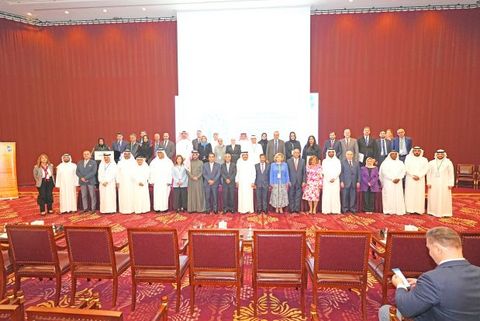Bahrain’s carbon emissions ‘just 0.07pc at global level’

CARBON emissions in Bahrain are insignificant and do not exceed 0.07 per cent at the global level, a top minister has said.
Oil and Environment Minister and Special Envoy for Climate Affairs Dr Mohammed Bin Daina, however, added that Bahrain was taking proactive measures to tackle other challenges posed by climate change – including rising sea level, threats to biodiversity and extreme weather conditions.
He said the government was committed to working on a series of projects to mitigate the impact over the years.
“Any developmental efforts will have a positive impact on the economy and negative effect on the environment,” the minister said, in his opening remarks at an international conference at Crowne Plaza Bahrain yesterday.
“Bahrain, like any other country, has witnessed growth and development, and followed the highest standard in handling the environment aspect.
“The region, in general, is working tirelessly to solve this problem (climate change), and if we see the percentage of carbon emissions from Bahrain, it does not exceed 0.07 per cent at the global level, which is insignificant.”
Dr Bin Daina was speaking at the International Conference on the Impact of Human Activity on the Right to a Healthy and Adequate Environment: Practices, Challenges and Solutions, organised by the National Institution for Human Rights (NIHR).
The forum addressed the topic of water scarcity, protecting ecosystem and wildlife and improving air quality.
“Bahrain plans to reduce emissions by 30 per cent (through decarbonisation and efficiency initiatives) by 2035, doubling tree coverage, and quadrupling mangrove coverage (by 2030),” said Dr Bin Daina, while also speaking about the National Energy Transition Plan aimed at increasing the kingdom’s renewable energy resources.
The GDN reported earlier this month that Dr Bin Daina said a series of important contingency measures have been planned over the next 10 years. This includes modern sea walls and wider beaches to combat rising sea levels.
He had said that the authorities have already recorded sea levels rising between 1.6 millimetres to 3.4mm every year since 1976.
Meanwhile, Dr Bin Daina yesterday praised the UAE for hosting the upcoming COP28 conference (November 30 to December 12), and said Bahrain was looking forward to being part of the international meeting to develop solutions to fight climate change.
Yesterday’s conference was attended by officials, diplomats and representatives from different United Nations agencies and NIHRs in the region, including from the UAE and Qatar.
“The NIHR takes part in the important conference ahead of hosting the COP28 event that will address different environment goals that require all actors to work together,” UAE’s National Human Rights Institution chairperson Maqsoud Kruse told the GDN yesterday.
Meanwhile, Mr Kruse’s Bahraini counterpart Ali Alderazi, in his opening remarks, spoke about rapid urbanisation across the world with new cities, housing projects, infrastructure and expanding networks being set up in every country.
“GCC states also embarked on such initiatives with development of urban and industrial zones that have impacted the wildlife and underground water,” said Mr Alderazi.
Bahrain is among several climate-vulnerable countries in the Arab region that are facing extreme hot weather conditions.
The GDN reported that electricity consumption reached a record 3,819 megawatts on August 13 as the temperature hit 44C with a humidity of 60.5pc. The power consumption on August 3 was 3,798MW.
The highest electricity consumption last year was 3,708MW on August 18. This is at a time when the kingdom’s power network is stable and operating with high efficiency.
The newspaper also reported last month that data gathered by the World Resources Institute Aqueduct Water Risk Atlas listed 25 countries that are currently suffering from extreme water stress every year – with Bahrain, Cyprus, Kuwait, Lebanon and Oman being the worst-affected.
Water stress is a measure of how much of its available water supply a country must use to meet the demand.


